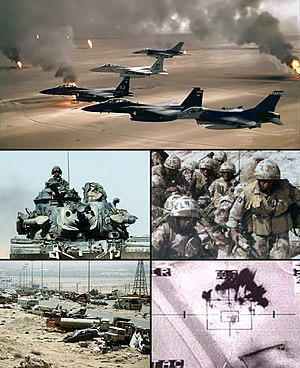First Gulf War 1990-1991
3:37 PM

The Persian Gulf War (August 2, 1990 – February 28, 1991), commonly referred to as simply the Gulf War 1990-1991, was a war waged by a U.N.-authorized coalition force from thirty-four nations led by the United States against Iraq.
This war has also been referred to (by the former Iraqi leader Saddam Hussein) as the mother of all Battles, and is commonly known as Operation Desert Storm for the operational name of the military response, the First Gulf War, or the Iraq War.
The invasion of Kuwait by Iraqi troops that began 2 August 1990 was met with international condemnation, and brought immediate economic sanctions against Iraq by members of the UN Security Council. U.S. President George H. W. Bush deployed American forces to Saudi Arabia almost 6 months afterwards, and urged other countries to send their own forces to the scene. An array of nations joined the Coalition of the Gulf War. The great majority of the military forces in the coalition were from the United States, with Saudi Arabia, the United Kingdom and Egypt as leading contributors, in that order. Around US$40 billion of the US$60 billion cost was paid by Saudi Arabia.
The initial conflict to expel Iraqi troops from Kuwait began with an aerial bombardment on 16 January 1991. This was followed by a ground assault on 23 February. This was a decisive victory for the coalition forces, who liberated Kuwait and advanced into Iraqi territory. The coalition ceased their advance, and declared a cease-fire 100 hours after the ground campaign started. Aerial and ground combat was confined to Iraq, Kuwait, and areas on the border of Saudi Arabia. However, Iraq launched Scud missiles against coalition military targets in Saudi Arabia and against Israel.
| Persian Gulf War | |||||||
|---|---|---|---|---|---|---|---|
 Clockwise from top: USAF aircraft flying over burning Kuwaiti oil wells; British troops in Operation Granby; Camera view from a Lockheed AC-130; Highway of death; M728 Combat Engineer Vehicle | |||||||
| |||||||
| Belligerents | |||||||
| Coalition forces
| Supported by: | ||||||
| Commanders and leaders | |||||||
| |||||||
| Strength | |||||||
| 959,600 1,820 Fighter aircraft and attack aircraft (1,376 American, 175 Saudi, 69 British, 42 French, 24 Canadian, 8 Italian) 3,318 tanks (mainly M1 Abrams(U.S.), Challenger 1(UK), M60(U.S.)) 8 aircraft carriers 2 battleships 20 cruisers 20 destroyers 5 submarines | 545,000 (100,000 in Kuwait)+ 649 fighters 4,500 tanks (Chinese Type-59s, Type-69s, & self produced T-55 T-62, about 200 Soviet Union T-72M's Asad Babil) | ||||||
| Casualties and losses | |||||||
| 240-392 killed 776 wounded (Coalition) 1,200 killed (Kuwait) 1,490-1,592 killed total | 20,000-35,000 casualties | ||||||
| Kuwaiti civilian deaths: Over 1,000 Kuwaiti civilians estimated killed during the Iraqi occupation in addition to 300,000 made refugees. Iraqi civilian deaths: | |||||||